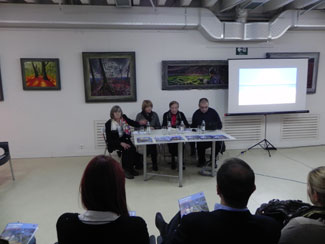THE END OF THE
MYTH OF KOSOVO
Public debate within the project "Promoting a Social Climate
Propitious to Transitional Justice and Culture of Non-impunity" realized with the
assistance of the Norwegian Helsinki Committee for Human Rights
Belgrade, November 25, 2011. |
 |
The fifth public debate in
a row in 2011 was staged in the "Vuk Karazic" Cultural Center in Belgrade's
municipality of Zvezdara. Editor-in-chief of the Helsinki Charter and regular contributors
to the magazine - Sonja Biserko, economist Vladimir Gligorov and historian Latinka Perovic
- addressed the audience.
Like on previous occasions Ms. Stanojlovic firstly presented the
magazine's editorial policy and orientation and then changed her focus to the topic
dominating the latest issue published under the banner "The End of the Myth of
Kosovo." In these days of the "dramatic countdown till December 9" (the
date when EU leaders in Brussels will decide on Serbia's candidacy), she said, the actual
government has to make crucial decisions while at the same time under enormous pressure
from anti-European forces in the country. |
"Border
crossing stations of Jarinje and Brnjak are today focal points of the opposition of the
entire conservative bloc, formal and informal centers of power, the Church, the media and
all other advocates against Serbia's course towards European integrations," she said.
Having briefly outline the genesis of the ex-Yugoslav crisis, Sonja
Biserko spoke about the developments "in and about" Kosovo. Once the
Belgrade-Prishtina dialogue on "technical issues" was launched Belgrade openly
begun implementing a strategy for Kosovo's partition (the idea was firstly mentioned in
public in the spring of 2011 though this has been Belgrade's one and only strategy since
Yugoslav crisis broke up). German Chancellor Angela Merkel "brutally dispelled the
illusion about sustainability of that option" when she told a press conference what
she had said to President Tadic over their tete-a-tete talk, she said. Referring to the
appeal for Russian citizenship by tens of thousands Kosovo Serbs, Ms. Biserko said that
Russia was just trying to profit from the situation - for it, Serbia is a
"backyard" from which it controls the European Union while maintaining with it
good relations. "It would be very good news should Serbia obtain EU candidacy on
December 9, mostly because domestic elite are incapable of defining a realistic national
interest," she said.
The origin of Serbia's problem with the European Union is in the fact
that the EU is based on rules, which escapes Serbia's understanding, said Vladimir
Gligorov. The audience was captured the most by his interpretation of the UNSC Res.
1244. According to the Resolution, said Gligorov, Serb institutions in North Kosovo are
definitely illegal. Mr. Gligorov took the Resolution 1244 as an illustrative example of
the manner in which domestic pubic is manipulated by half-truths and often by
half-knowledge of fundamental principles of the international law. The great majority of
domestic official and opinion-makers refer to the term "sovereignty" as an
absolute doctrine, which totally distorts its true meaning. "Sovereignty means
fulfillment (of a country's) obligations to other countries," he said, adding,
"If Greece cannot pay its debts, it is not a sovereign country." According to
Mr. Gligorov, the ongoing commotion within EU will most probably result in a federalized
decision-making system and a stronger fiscal integration.
"If attitude towards Europe is a crucial point of today's social
and political drama, one should remember that this has been Serbia's constant dilemma in
its modern history," said Latinka Perovic. In the meantime and in many aspects
- demographic decline, aging population, the fact that 80 percent of the young see no
prospects in their country and the like - "Serbia has touched the bottom of
life." The appeal originating from the society - the "Turnabout" initiative
aiming at European prospects - is most significant against such a backdrop. The present
trend of "amnestying individuals" for Serbia's actions in the past two decades
is hardly sustainable as a political philosophy, she said. The same refers to initiatives
for, say, the boycott of elections or "blank ballots" - these initiatives are
politically wrong because there are always options among which citizens can make their own
choices. |
